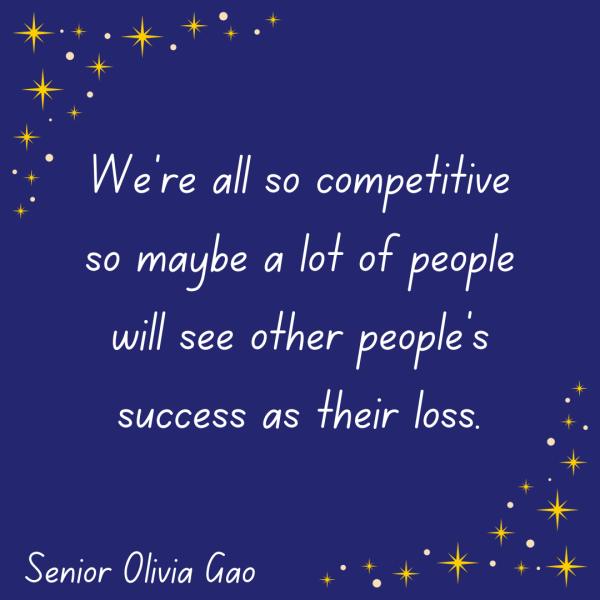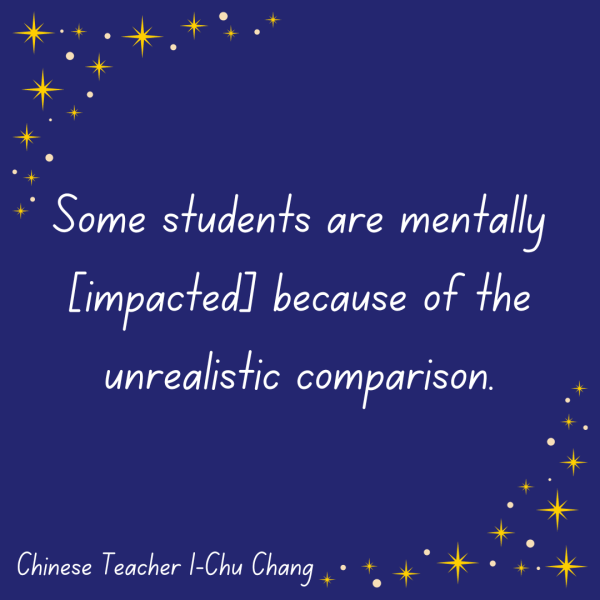At MVHS, students are surrounded by success stories, varying from students getting into Harvard to becoming the CEO of a company. In sophomore Megan Yang’s opinion, success stories can be a way to ground one’s hopes. According to her, success stories are a way of seeing concrete evidence of what works and what results are realistic.
“I would say that [a success story] makes my hopes a little bit lower because I will say that in the past, I do tend to overestimate a little bit,” Yang said. “I guess I later realized that it’s not really realistic. So it does help me lower my goals, which doesn’t feel really good at first, but then I realize that I’m just being more realistic.”
Chinese teacher I-Chu Chang believes that success stories are better understood by taking into account the subject’s background. If there is no context, she worries there is potential for people to misunderstand the story. On the flip side, if the subject’s background resonates with the listener, she believes it is possible for the story to have a positive effect.
“Usually, when we hear about the success story, we only look at what this person does or that person does differently than others, but without considering where they come from,” Chang said. “Once people know more about this person in particular, like, let’s say going through the same experience and maybe how they are brought up, what your family situation is. After that has been taken into consideration, sometimes people will feel connected and would like to copy from that person.”

Senior Olivia Gao mostly hears about success stories from other students. However, when she hears success stories about getting into good colleges online, she compares herself to those people and becomes demotivated. Gao also believes the negative mindset with which other people view success stories is caused by the toxicity of MVHS.
“We’re all so competitive so maybe a lot of people will see other people’s success as their loss,” Gao said. “When you hear more success stories, it’s like there’s less of an opportunity for you to succeed because that certain pool of people have already succeeded.”
For Gao, success stories from friends are much more likely to bring her hope in comparison to success stories from people online. She attributes this to the fact that her friends are part of the same demographic as her, thus making their stories more relatable. For a similar reason, Yang feels like her brother’s success story of getting into University of California Los Angeles gives her hope.
“I think I’m relatively optimistic about my future because I have an older brother so I can sort of follow in his footsteps,” Yang said. “I’m thinking if I just do what he does or do more than what he does, I have a better chance.”
Junior Anirudh Bhattiprolu agrees with the idea that the person behind the story matters. For example, he recognizes that it could be more motivating to hear the story of someone who acquires skills rather than being born with them. He cites Steve Jobs as one example of this.
“Just the fact that [Steve Jobs’] mindset when you look at it in depth and do actual research about it, his way of thinking made him look like a prodigy,” Bhattiprolu said. “At a young age, he was a born prodigy. So when you look at individuals such as that you get demotivated.”

Chang emphasizes the fact that there are many factors that have to be considered when hearing about success stories. She believes that in success stories, there could be elements of luck involved that aren’t immediately clear. Though she believes that success stories can be positive for students, she also believes it is possible for success stories to be harmful for students.
“There should [at least] be some basic [back]ground [so] at least we don’t just compare everything; we don’t just compare directly without looking at the bigger picture, or looking into the details more,” Chang said. “Some students are mentally [impacted] because of the unrealistic comparison. So that’s why it could be dangerous to just directly copy what other people are doing without considering a lot of stuff.”









